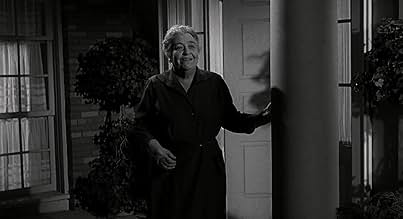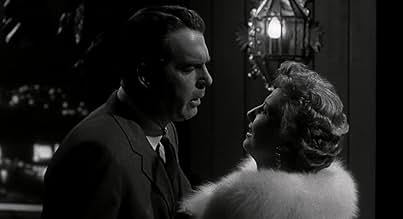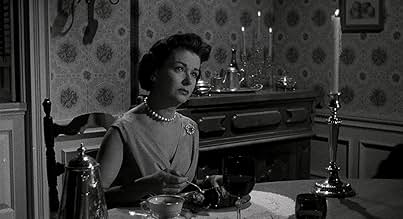Ajouter une intrigue dans votre langueWhen a toy manufacturer feels ignored and unappreciated by his wife and children, he begins to rekindle a past love when a former employee comes back into his life.When a toy manufacturer feels ignored and unappreciated by his wife and children, he begins to rekindle a past love when a former employee comes back into his life.When a toy manufacturer feels ignored and unappreciated by his wife and children, he begins to rekindle a past love when a former employee comes back into his life.
- Réalisation
- Scénario
- Casting principal
Avis à la une
While watching this film, it's often tempting to expect a formulaic story and guess where it will go next. But, as written by Bernard Schoenfeld (based on a story by Ursula Parrott), it often goes in a different direction. When it does veer in predictable territory, it still does so with some unexpected surprises.
It helps to have the solid direction of Douglas Sirk ("All That Heaven Allows" (1955), "Written on the Wind" (1956) and "Imitation of Life" (1959)) as well as a solid cast. MacMurray is superb in a role rarely shown on screen - a neglected patriarch who feels the hurt. But Stanwyck is truly at her best (which is saying a lot) in a multi-layered role.
At the beginning, she shows true charm, class, and charisma as someone so well-mannered and entertaining, one would want to be in her presence at any gathering. As a successful fashion designer, she's almost comical in a scene of being in such demand for time at her office that she ends up snapping at everyone. In the later dramatic scenes, she shows her true power especially during a conversation with Cliff's teenage children. This performance matches what is likely her best - in "Stella Dallas" (1937).
It makes one yearn for the times in Hollywood when experienced actresses over forty got roles that showed their best. Those days may be gone for now but at least films like this are great reminders of a great era. - dbamateurcritic
OUTSTANDING ACHIEVEMENT: Acting by Barbara Stanwyck
MacMurray is a successful toy developer, Clifford Groves, married to Marion (Bennett), and they have three children (Reynolds, Perreau, and Nugent). Marion is preoccupied with the kids and the household, while MacMurray is longing for some alone time with her and to do something different - take a weekend off, go to the theater -- but something always happens that prevents it.
When Marion can't make a theater performance because of their daughter's dance recital, Cliff stays home alone. A woman who once worked for him, Norma Vale (Stanwyck) comes over to say hello. She's now a successful dress designer in from New York. He takes her to the theater instead, and then she asks to see his office.
When a planned weekend in the desert with Marion doesn't work out because one of the girls breaks her ankle, Marion insists that Clifford go without her and relax. There, he runs into Norma again. Unfortunately, his son (Reynolds) shows up and thinks Cliff and Norma are involved. He and his friends leave without making their presence known to his dad. Without realizing what's happening, Cliff is falling for Norma; and he doesn't know that she's always been in love with him.
This is a midlife crisis, '50s style, with the underpinning of the grass is always greener. That wasn't the original intention, of course - the original intention of the film is that Norma is lonely and would give up her wonderful career to have a family like Marion and Cliff have. People still feel this way, but today, it's more because of the road not taken, not so much because of dissatisfaction. Nothing's perfect, as the film shows us. Cliff sees Norma's freedom, the attention she pays him, her interest in his work. He feels in fourth place behind the kids to Marion. He's sick of being like the robot that is his latest toy. You wind him up, he works, he comes home, he has dinner, he goes to bed. With Norma he sees an opportunity for something different. Youth. To be put first. Endless possibility.
What a lovely movie, and I thought I was sitting down to some second feature. Instead, it has Sirk's magic touch and his sly criticism of the picture-perfect '50s American life. Frankly, I could have slapped the kids and Marion for not seeing what's in front of their faces, but to be fair, kids are self-involved, and Marion is completely committed to doing what she thinks is important for Cliff and their family.
Wonderful acting, with MacMurray as the frustrated Everyman, Bennett as an attractive, disciplined woman, and Stanwyck has someone who has earned wisdom the hard way, through hard work and disappointment.
Highly recommended.
Just as he's feeling especially insignificant along comes old flame Barbara Stanwyck in her third fine film with MacMurray to fan the sparks of his mid-life crisis into a full-blown blazing passion, to the extent where he has a secret if accidental weekend away with her and quickly comes to contemplate leaving his family for a life of excitement with her. Which way will he turn and what part will his two mortified older children, who in typical Sirkian grand coincidental fashion, learn of his plans, play in his final decision?
Once again, Sirk brings family members to a crisis-point and even if the resolution this time takes a conventional course, still there's real drama in these excellently crafted and written scenes of anything but cosy domesticity. Cynics may make sneering remarks about all this amounting to shallow soap operatics but I think they would be wrong. Post-War Western and especially American society was evolving even against the "I Like Ike" background of greater personal wealth and the growth in consumerism but just under the surface it wasn't all sweetness and light and Sirk was one director who caught that change in attitudes in his mid-50's work.
Once again MacMurray surprised me with the depth and roundedness of his performance as a middle-aged man cornered by society's expectations of him while Stanwyck in one of her last major roles before she, like MacMurray a bit later, turned to TV, is as good as she usually is as the unwitting Eve in Fred's supposed Garden of Eden. Her character of a flamboyant, self-confident, but importantly unmarried career-woman is equally worthy of deeper investigation as MacMurray's worm-turning Mr Suburbia.
Lesser known than other Sirk dramas of the decade it's as good as any of them in my opinion and well worth watching.
While Sirk's films have often been branded "woman's pictures", "There's Always Tomorrow" is indeed very much a man's picture. It takes a hard and deep look at the role of the male breadwinner and the picture it comes up with is not a pretty one. What we are shown is a man who when young, courted the prettiest girl, married, had children and worked hard to build up a successful business. He is now middle aged and having achieved it all, begins to feel himself taken for granted by his wife and children. His needs are completely neglected. His wife has little interest in him sexually being totally wrapped up in fulfilling the unending needs of their self centered ungrateful children. It's a scenario all too familiar to millions of men. Fred MacMurrays's Clifford Groves has become a robot similar to the one his successful toy manufacturer has created. No wonder that Norma Vale's (Stanwyk) reappearance in his life presents an opportunity to regain his lost dreams. She's an independent career woman, who sees his situation as somewhat idyllic from the outside. But with the usual intelligence of a Stanwyk character, she has no illusions as to a possible future with him. Despite the brief and obligatory conciliatory ending, Clifford Groves' future does not bode well. It should come as no surprise that the film was not well received at the box office.
"There's Always Tomorrow" has many of the hallmarks of Sirk's craftsmanship. The studio refused to grant him his request for the film to be shot in color, despite having provided Universal with some of its highest grossing pictures of the decade. At least his demand for his favorite cameraman Russell Metty was granted. Metty as always, was the perfect partner in realising Sirk's vision. His interior filming in particular is a lesson in cinematography. He had a penchant for shooting characters behind banisters, framed in mirrors and caged behind fences to enhance the sense of their being trapped. MacMurray and Stanwyk are constantly gliding through dark shadow and bright light reflecting the inherent brightness and darkness in their lives.
At this point of writing "There's Always Tomorrow" has not been released in any format and rarely gets a showing on television. It's a gross injustice to an extremely important director and a wonderfully made, moving piece of cinema.
Le saviez-vous
- AnecdotesAcclaimed documentary filmmaker Errol Morris named it as one of his 10 favorite films in the 2002 BFI Sight & Sound Poll.
- GaffesNear the end, Vinnie is telling his girlfriend that he was wrong "about Norma and Cliff" in these exact words. But Cliff is his father; he wouldn't refer to his father by his first name.
- Citations
Norma Miller Vale: Love is a very reckless thing. Maybe it isn't even a good thing. When you're young and in love, nothing matters except your own satisfaction. The tragic thing about growing older is that you can't be quite as reckless anymore.
- ConnexionsFeatured in Perspectives sur la famille américaine (2008)
- Bandes originalesBlue Moon
(uncredited)
Written by Richard Rodgers and Lorenz Hart
Played on one of the toys and heard as a theme throughout the film
Meilleurs choix
- How long is There's Always Tomorrow?Alimenté par Alexa
Détails
- Date de sortie
- Pays d’origine
- Langue
- Aussi connu sous le nom de
- Pasión otoñal
- Lieux de tournage
- Société de production
- Voir plus de crédits d'entreprise sur IMDbPro
- Durée1 heure 24 minutes
- Couleur
- Rapport de forme
- 1.85 : 1
Contribuer à cette page




































